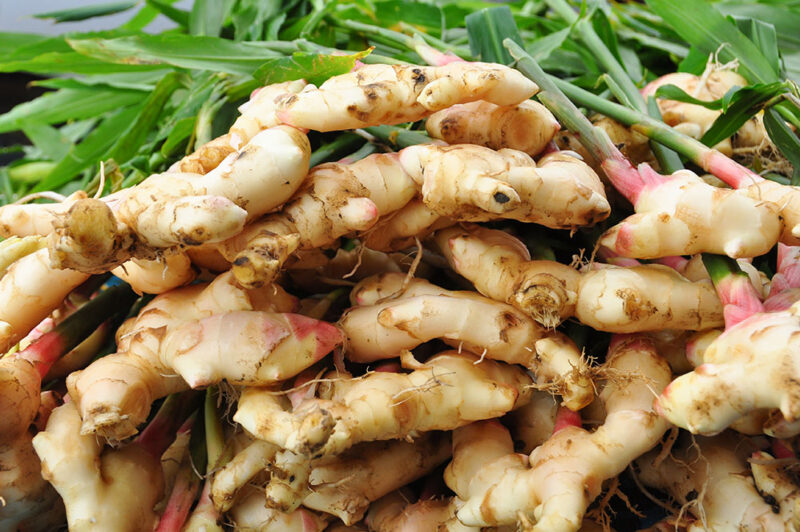Ginger, one of the most widely used spices globally, plays a pivotal role in Nigeria’s agricultural landscape. As a major cash crop, ginger contributes not only to the country’s food security but also to its economic development. Nigeria ranks as one of the top producers of ginger worldwide, with states like Kaduna, Niger, and Bauchi being key production areas. In recent years, ginger farming has gained significant attention due to its potential in strengthening Nigeria’s food security. This article explores how ginger farming contributes to food security in Nigeria and why it should be further prioritized.
1. Ginger as a Nutritional Booster
Ginger is renowned for its numerous health benefits, including anti-inflammatory and digestive properties. It is used in the preparation of a variety of food products ranging from beverages and snacks to soups and stews. By providing essential nutrients, ginger helps to enhance the nutritional value of diets in many Nigerian households, especially in rural areas where food insecurity is a pressing issue.
The plant contains essential vitamins and minerals like potassium, magnesium, and vitamin C, which are crucial for maintaining health, especially for children, pregnant women, and the elderly. The ability of ginger to improve digestion and boost immunity adds an extra layer of value, making it a vital part of the food security chain.
2. Income Generation for Farmers
Ginger farming has the potential to provide a stable income for millions of Nigerian farmers, particularly smallholder farmers. By cultivating ginger, farmers can diversify their crops and mitigate the risks of dependency on just one crop. This diversification strengthens rural economies and contributes to food security by ensuring consistent food availability.
The revenue generated from ginger farming supports not only the farmers but also contributes to the local economy through value-added products such as ginger powder, oils, and even processed foods. These products are not only consumed locally but also exported, contributing to the country’s foreign exchange earnings. As the demand for ginger increases globally, Nigerian farmers have an opportunity to boost their income, which in turn can enhance their purchasing power to access other foods and resources.
3. Promoting Sustainable Agricultural Practices
Ginger farming, when done using sustainable practices, can contribute to long-term food security. Ginger is typically grown in tropical and subtropical regions, which are well-suited for Nigeria’s climate. With the right agricultural techniques, such as crop rotation and organic farming, ginger can be grown alongside other crops, enhancing soil fertility and reducing the reliance on chemical fertilizers.
By encouraging the use of sustainable farming methods, Nigeria can ensure that ginger farming continues to contribute to food security without compromising environmental health. Moreover, supporting small-scale ginger farmers with training on better farming practices can increase yields and reduce food waste, ensuring that more ginger reaches the market and food supply chain.

4. Ginger as a Cash Crop for Export
As a key agricultural export, ginger plays a significant role in Nigeria’s foreign trade. The country is one of the largest exporters of ginger, with major markets in Europe, Asia, and North America. This export trade not only supports the national economy but also contributes to the food security of the country by earning foreign exchange.
Increased foreign demand for Nigerian ginger can provide opportunities for farmers to improve their farming techniques, increase productivity, and achieve higher profits. These profits can be reinvested into other areas of agriculture, ensuring a stable and diverse food supply for the population.
5. Reducing Food Imports
The reliance on food imports is a major challenge to food security in Nigeria. By focusing on boosting local agricultural production, particularly in the cultivation of high-value crops like ginger, Nigeria can reduce its dependence on imported food products. With the right infrastructure and support for ginger farming, Nigeria can meet both local and international demand, reducing the need for food imports and ensuring a more self-sufficient food system.
6. Job Creation and Rural Development
The ginger value chain provides opportunities for job creation in various sectors such as farming, processing, packaging, and transportation. From farmhands to entrepreneurs, ginger farming supports thousands of individuals, helping to reduce poverty and improve living standards in rural communities.
Job creation within the ginger industry also strengthens food security by increasing access to nutritious food and creating economic stability. Furthermore, with increased investment in infrastructure, such as processing plants and storage facilities, ginger farming can improve the food supply chain, reducing food loss and waste.
Conclusion
Ginger farming has a multifaceted role in promoting food security in Nigeria. Beyond its direct contributions to nutrition, it serves as a source of income for farmers, fosters sustainable agricultural practices, boosts export potential, and creates employment opportunities. By investing in ginger farming and supporting smallholder farmers with the necessary tools, knowledge, and infrastructure, Nigeria can significantly strengthen its food security and reduce dependence on imports.
Given its potential, ginger farming should be promoted as part of broader agricultural policies aimed at improving food production and enhancing the livelihoods of farmers. As the world continues to face challenges in securing sustainable food supplies, ginger farming could be one of Nigeria’s key solutions for achieving food security and economic resilience in the years to come.
Ajigofarms is a reliable global agricultural purchase sourcing with profound expertise in the manufacturing, and exportation of food crops. We are tested, and trusted suppliers of all kinds of cash crops and food crops. Our constant supply chain solution makes exporting easy, quick, and safe, we are identified with timeliness and meeting up with deadlines. Regardless of the region you are located in worldwide, you can reliably order your Agric products and be rest assured of successful delivery.




